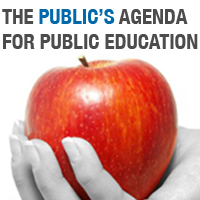How does Michigan rank on school spending?
Michigan will spend about $13 billion on K-12 education this year – the single largest use of state revenue.
And how those sums will get spent next year and beyond will consume a considerable amount of attention at the Capitol, where views on running schools can be deeply divided.
In April 2011, Gov. Rick Snyder stated, "Michigan’s education system is not giving our taxpayers, our teachers, or our students the return on investment we deserve."
In concert with Republican majorities in the Legislature, Snyder has pursued initiatives to tie state aid to performance, be it academic results for students or even modifications in how local school districts provide benefits to teachers and support staff.
In addition, after years of regular increases, the state’s minimum per-pupil grant – the money schools rely on for standard operations – fell. At $6,966, it is $142 less than for 2006-07. Adjusted for inflation, the per-pupil minimum is the lowest it has been since 1998.
That trend, say some in the field, is hurting Michigan’s ability to compete.
In the past decade, Michigan moved from slightly above average on many national tests to below average. For example, Michigan is 35th in fourth grade math proficiency and 31st in eighth grade reading.
"Just spending more money per se doesn't have a strong effect. You have to spend it on the right things," said Robert Floden, associate dean for research in Michigan State University's College of Education. "But when you get too low amounts of spending on education, there is no way to spend it so well that you do better than you would with at least a moderate amount of money."
While participants in the Center for Michigan’s year-long townhall series on K-12 education were not asked if they wanted to spend more on education, large majorities did say they wanted better teachers and better results – and that such gains likely would require more dollars.
How Michigan ranks
Since fiscal 2001, the state’s School Aid Fund has oscillated from a low of $10.89 billion in fiscal 2001 to a high of $13.01 billion in fiscal 2007. When adjusted for inflation, had Michigan maintained 2007 spending levels, this year’s K-12 budget would be $14.41 billion, instead of the actual $12.94 billion. Such calculations are at the heart of political debates that can seem nonsensical to the average citizen – how can a larger overall amount be considered a “cut”?
A U.S. Census Bureau report using 2010 figures had Michigan rated No. 9 nationally for school revenue from all sources (federal, state and local). In 2010, Michigan was spending $10,644 on a per-pupil basis, from all sources, -- $29 above the national average and ranking the state 23rd overall. Among Great Lakes states, Michigan’s rate was second-lowest to Indiana ($9,611).
Between 1992 and 2010 the average per-pupil amount nationally doubled from $5,000 to more than $10,000.
Education spending based on personal income in the state placed Michigan No. 13, the Census Bureau reported.
Earlier this month, the state’s Revenue Estimating Conference projected that the School Aid Fund would grow about 3 percent – or about $300 million per year -- for fiscal 2014 and fiscal 2015. At the same time, the state expects the number of schoolchildren will continue its recent decline.
David Arsen, professor of educational administration at MSU, said the state's first funding priority should be for an inflation adjustment to the per-pupil grant, something that hasn't happened in several years. He said the cuts over the past several years have reduced the quality of education that Michigan students receive.
His second priority would be bolstering early childhood education – a position already garnering considerable support in the Legislature and the administration for the coming year.
Beyond that, he said, the state should take a comprehensive, long-range look at how it funds education. He says Michigan should devote a portion of last year's surplus to support the work of a broad-based task force evaluating the state's long-term public education funding needs — from preschool through higher education. Massachusetts undertook a similar process several years ago.
The task force would evaluate the structure of revenue sources, determine adequate funding levels and design a system for distributing revenue that is sufficient, equitable and stable. It would also tackle one of the key problems untouched by Proposal A of 1994: the funding for school buildings.
"We've never done that here in Michigan," he said.
“Dumping more money in the system is not a solution,” countered Eileen Weiser, a member of the State Board of Education. She compared investing more in Michigan’s current public education system to bigger and bigger car repairs for an old jalopy. “At some point, you have to make a decision to buy a new car,” Weiser said.
“Michigan has in various times been in the top 10 in funding schools but in the bottom half of student achievement,” Weiser said. “If there were a relationship between money and competence, it would show up in results.”
Chris Andrews is senior editor at Public Policy Associates, Inc. In addition to working as a freelance writer and editor, he teaches journalism at Michigan State University. Andrews was an editor at the Lansing State Journal and a reporter at the Rochester, N.Y., Times-Union.
Michigan Education Watch
Michigan Education Watch is made possible by generous financial support from:
Subscribe to Michigan Education Watch
See what new members are saying about why they donated to Bridge Michigan:
- “In order for this information to be accurate and unbiased it must be underwritten by its readers, not by special interests.” - Larry S.
- “Not many other media sources report on the topics Bridge does.” - Susan B.
- “Your journalism is outstanding and rare these days.” - Mark S.
If you want to ensure the future of nonpartisan, nonprofit Michigan journalism, please become a member today. You, too, will be asked why you donated and maybe we'll feature your quote next time!




